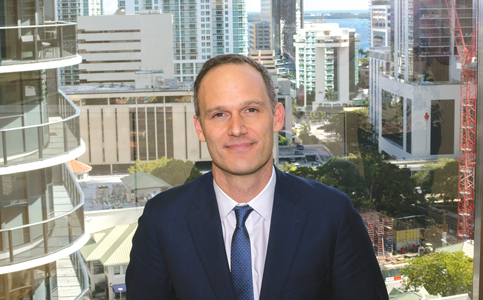
After the height of the post-pandemic technology sector relocation and expansion trend, Miami continues to attract tech firms and startups at a reduced level, still depending on local talent and business incentives.
Technology has been a targeted industry for recruitment efforts for a long time, said James Kohnstamm, executive vice president of economic development at the Miami-Dade Beacon Council, the county’s public-private partnership for economic growth.
The council’s technology committee focuses on development the tech industry in Miami through recruitment strategies for tech companies around the world and retention programs for local startups aiming to grow in Miami. The committee is made up of private sector leaders across the community “that helps us define and drive our strategy,” said Mr. Kohnstamm.
Part of that economic development recruitment strategy is “telling our story,” he said. “We direct marketing, social media, and then, as we move to direct recruitment for companies, we provide direct information to those firms in their markets.”
As an example, the Beacon Council attended the Paris Air Show (June 19-25). A Miami team held several sessions targeted at technology called “New tech hub of the Americas,” hosted by Brickell-based law firm Jones Day.
“We had more than 80 attendees across French technology firms and startups to talk about the opportunities to do business in Miami, but more specifically, we had professional services, like law firms to talk about specifics of what it means to actually set up,” said Mr. Kohnstamm. “Then, we had a panel of French startups who are actually investing in Miami provide real, authentic stories about [their experience.]”
The Beacon Council has also hosted similar programs in London, focused on financial technology and medical technology.
“We worked very closely with a group called Association of British Health Tech Industries, who are very interested in investing in the US and have visited Miami in the past,” said Mr. Kohnstamm.
That program was hosted by downtown Miami law firm McDermott Will & Emery.
“In those types of opportunities, we speak directly to tech companies that are not in our community and are considering relocating here,” he added. “We are able to give them a lot of details about what this market offers.”
Technology, he said, continues to be a growth area for the county. “There was a specific high point of demand in technology, but also across other sectors, around 2021 and 2022, where we saw heightened demand across all markets. That has not gone away, but it has leveled off or [reached a] sustained level.”
As of 2017, there were 1,729 tech companies in Miami-Dade, offering 11,383 jobs in 2018, which average annual salary was more than $94,000, according to data from the Beacon Council. The biggest sectors within tech were custom computer programming services and computer systems design services. The sector offering the greatest salary was software publishing, with an average earning salary of $105,629.
But technology continues to be an active pipeline in business expansions and relocations. Security management software company Kaseya recently placed itself in the spotlight as it announced a commitment to create 3,400 full-time jobs over the next three years in the county, with jobs paying average annual salaries of $107,000. The company’s footprint is expected to pass 4,200 jobs, making it one of the area’s largest employers in a few years.
After the firm announced a substantial expansion downtown, the county has awarded them up to $4.56 million in performance-based economic incentives. This is the largest tech job creation incentive the county has given.
Last February, system integrator company LeverX, born out of Silicon Valley, announced it would be relocating to downtown Miami.
Similarly, Bungalow, a full-service prop-tech platform for renters in major metros across the US, announced late last year that it would relocate to Wynwood at The Annex, a Class-A eight-story office building completed in 2019. This expansion would allow the company to double its office footprint, bringing along 20% of its employees to Miami. The company is a startup that originated from Atomic VC, a venture studio in San Francisco that funds tech firms.
On the medical tech side, Neocis, a dental tech startup that performs automated dental surgeries and other procedures, announced last year it would be relocating to Wynwood and signing a 38,000-square-foot lease at 545Wyn. The company secured $40 million in venture funding last October.
While the tech industry now is experiencing layoffs and tightening in the market at the national level, “that’s going to be reflected in Miami numbers as well,” said Mr. Kohnstamm. “We’re already seeing it in venture capital investments. It’s changed in the first quarter or two of 2023, so we’ll see a bit of tightening of the market at the beginning of the summer, but we still have good opportunities under development.”
The biggest opportunity Miami offers, he said, is talent. “Miami’s technology talent has really transformed in the last decade. There has been a lot of targeted efforts to do that.”
Programs like Miami Dade College’s Good Jobs Challenge, which received $10 million from the US Department of Commerce’s Economic Development Administration to fund and encourage growth in the tech jobs pipeline, is a great example of those efforts.
“Florida International University and the University of Miami produce great engineering talent as well,” said Mr. Kohnstamm. “It’s also the greatest opportunity for us to grow where we need to be producing more to be able to continue to compete for the jobs of the future and the companies that are having the highest growth.”
Although the cost of living and housing has substantially increased in Miami-Dade, the market continues to be a relative bargain, compared to markets such as New York, San Francisco, and Chicago, said Mr. Kohnstamm. “But we’re very much in competition with Dallas, Atlanta, Nashville and other [markets] that offer more flexibility in the overall costs of living.”
https://www.miamitodaynews.com/2023/07/18/miami-tech-influx-slows-still-strong/


